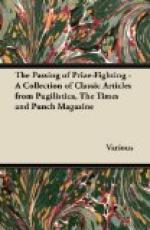* * * * *
Further Memories (HUTCHINSON) is justly called by its publishers a “fascinating volume.” The designation will not surprise those who enjoyed the late Lord REDESDALE’S former book of recollections. The present collection is a little haphazard (but none the worse for that), its chapters ranging over such diverse subjects as Gardens and Trees, QUEEN VICTORIA, BUDDHA, and the Commune. Certainly not the least interesting is that devoted to the story of the Wallace Collection, of which Lord REDESDALE was one of the trustees. His account of the origin and devolution of the famous treasures will invest them with a new interest in the happy days when they shall again be visible. Mr. EDMUND GOSSE contributes a foreword to the present volume, in which he draws a pathetic picture of the author, still unconquerably young, despite his years, facing the future with only one fear, that of the unemployment to which his increasing deafness, and the break-up of the world as it was before the War, seemed to be condemning him. Further Memories was, we are told, undertaken as some sort of a safeguard against this menace of stagnation. It was a measure for which we may all be glad, as we can share Mr. GOSSE’S thanksgiving that the writer’s death, coming when it did, saved him, as he had wished, “from all consciousness of decrepitude.”
* * * * *
When an unstable young wife, getting tired of a pedantic husband in the way so familiar to students of novels, goes off with a companion more to her taste, anyone can foresee trouble, or what would there be to write about? When, further, her detestable lover, seeking change and fearing the financial lash of his properly indignant parent, terminates the arrangement, even an observer of real life can guess that her return to her rightful lord and master must entail disagreeables; but only a reader well brazened in modern fiction could expect Don Juan promptly to make love to and marry the husband’s sister without a word of apology to anyone. This kind of rather unsavoury dabbling in problems best left to themselves generally concludes with the decease of most of the characters and a sort of clearing up, and to this rule, after many years and pages of discomfort, MARY E. MANN’S new story, The Victim (HODDER AND STOUGHTON), is no exception. Not a very attractive programme, but all the same the volume has one or two redeeming features. For one thing, the sister is clearly and attractively drawn, and so is the picture on the wrapper, though it represents no particular incident to be traced in the pages of the volume which it adorns. Writing more strongly than is perhaps her wont, Mrs. MANN has taken some trouble to emphasise the fact that in these cases of uncontrolled passion the major penalty of guilt is borne not by the offenders themselves but by the first generation succeeding. This does need saying occasionally, I suppose, and to that extent The Victim redeems itself from the charge of trivial unpleasantness.




